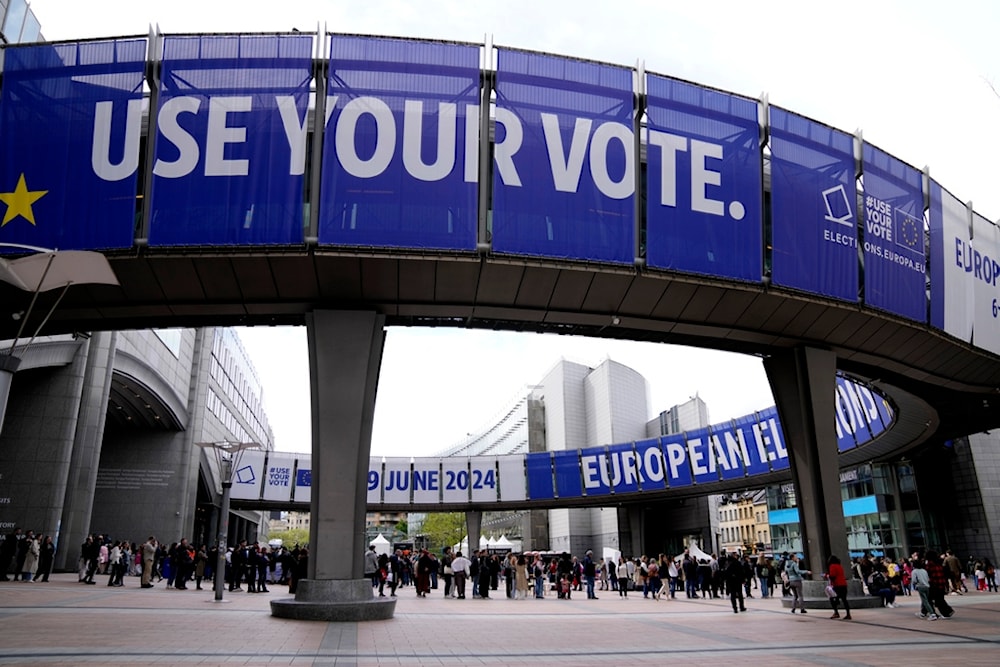European Parliament elections: Political landscape, key players
The outgoing parliament, which has been in session for the past five years, has been marked by the dominance of several major political groups, each representing distinct ideologies and priorities.
-

People wait in line to visit the European Parliament during Europe Day celebrations in Brussels on May 4, 2024. (AP)
Europe is gearing up for the upcoming European Parliament elections, and the continent finds itself at a crucial juncture as it grapples with pressing issues, ranging from economic recovery to climate change and geopolitical tensions.
Against this backdrop, the political landscape within the EU is taking shape with a wide array of parties and alliances vying for influence in Brussels.
The outgoing parliament, with a five-year tenure, has been marked by the dominance of several major political groups, each representing distinct ideologies and priorities.
European People's Party
Leading the pack is the European People's Party (EPP), a coalition often described as "center-right" that is largely spearheaded by German Christian Democrats.
With a significant presence of Polish and Romanian members, the EPP has wielded considerable influence in Brussels.
Having formed alliances with both Socialists and liberals over the past term, the group has championed policies such as the Green Deal.
However, it has often been accused of elitism due to its disregard for the concerns of working-class citizens. It has also been criticized for providing cover to far-right groups.
On May 8, The Guardian reported that the EPP declined to sign a letter condemning far-right political violence. Some believe that the party intentionally did so in order to secure votes among the far-right.
On a related note, incumbent President Ursula von der Leyen is herself a member of the EPP. She faces the prospect of being charged with complicity in Israeli war crimes at the International Court of Justice, as per latest reports.
Progressive Alliance of Socialists and Democrats
On the "center-left" front, the Progressive Alliance of Socialists and Democrats (S&D) is often viewed as a force for social justice, economic equality, and progressive policies.
The party, however, is strongly supportive of austerity measures and fiscal policies that severely harm social welfare.
Moreover, recent controversies surrounding the funding practices of some members have brought into question the group's integrity and transparency.
In December 2022, the faction found itself embroiled in a scandal known as Qatargate, which involved allegations of foreign countries bribing EU lawmakers. The scandal implicated several high-ranking S&D members, including Eva Kaili, a Greek lawmaker, and Pier Antonio Panzeri, a former Italian MEP.
Renew Europe
Meanwhile, Renew Europe emerges as a significant contender, propelled by French President Emmanuel Macron's Renaissance party.
As the second-largest group in the ruling coalition, Renew Europe advocates for European unity and democratic values.
With a platform centered on innovation, economic reform, and social liberalism, the group says it seeks to position itself as a driving force for change within the EU.
Read more: Macron wants von der Leyen replaced: Bloomberg
But like any other pro-EU group, Renew Europe lacks ideological clarity and supports a neoliberal agenda that favors the interests of Europe's elites over those of the working classes.
The party nonetheless distinguishes itself on the basis of a strong emphasis on innovation, technology, and digitalization as drivers of economic growth and societal progress.
Greens/European Free Alliance
In the environmental arena, the Greens/European Free Alliance (Greens/EFA) has made important strides in advancing climate change initiatives under the EU's Green Deal.
With a focus on environmental sustainability, the Greens/EFA group is said to garner widespread support among younger voters and progressive-minded individuals.
But despite their advocacy for the environment, the Greens have faced criticism on several fronts, including the heavy costs associated with transitioning to a green economy.
Some accuse them of being excessively radical. Others argue that their proposals are often unrealistic and lack feasibility or consideration of practical challenges.
Nevertheless, their inclusion among Parliamentarians makes the election process appear a bit more democratic.
Read more: French farmers to start 'historic' blockade over unfulfilled demands
European United Left/Nordic Green Left
The European United Left/Nordic Green Left (GUE/NGL) represents the left-wing faction within the European Parliament, emphasizing workers' rights, economic equality, and social justice.
Comprising members from various leftist parties across Europe, the GUE/NGL seeks to challenge neoliberal policies and advocate for a more equitable and inclusive society.
It is arguably the group most inclined toward impartial views, largely due to its anti-Western stance on foreign policy matters.
Clare Daly, a notable member of the faction, has garnered international attention for her impassioned speeches advocating for Palestine within the Parliament.
European Conservatives and Reformists
The European Conservatives and Reformists (ECR), once home to UK Conservatives, now leans heavily toward Eurosceptic parties like Poland's Law and Justice.
Their influence is expected to grow, especially with the rise of the Fratelli d'Italia group led by Italian Prime Minister Giorgia Meloni.
As proponents of conservative values, economic liberalism, and national sovereignty, the ECR is argued to be aiming to provide an alternative voice within the EU political landscape.
The group has nonetheless faced heavy criticism due to its skepticism toward the EU project, in addition to its members being identified as advocates of far-right ideologies.
Identity and Democracy
Lastly, the far-right Identity and Democracy (ID) group, featuring France's RN party, has capitalized on voter disillusionment with mainstream politics, particularly over economic issues and immigration concerns.
With a platform centered on national identity, anti-immigration policies, and Euroscepticism, the ID group seeks to challenge the status quo and promote nationalist agendas across Europe.
Akin to ECR, the group has faced criticism due to its far-right leanings. Some of its members have also been accused of spreading misinformation and engaging in divisive political tactics.
In most cases, this sort of criticism mainly emanates from pro-EU neoliberal opponents.
Read more: More than 60% of French voters think Le Pen could be next President

 6 Min Read
6 Min Read








